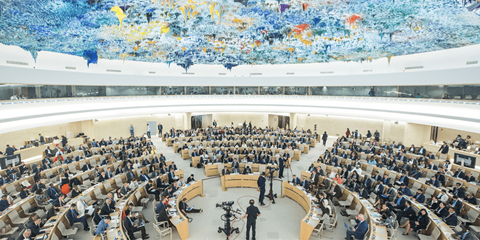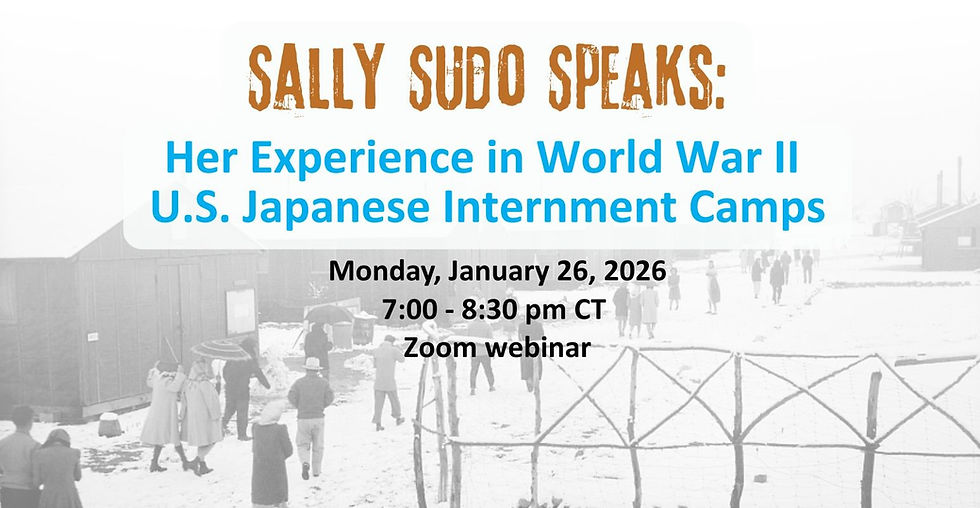June R2P In Focus
- The Global Centre for the Responsibility to Protect
- Jun 29, 2025
- 4 min read

R2P in Focus is a monthly publication by the Global Centre for the Responsibility to Protect highlighting recent events and publications on mass atrocity prevention and R2P.
Recent Releases Marking R2P's 20th Anniversary
UN General Assembly Debate on the Responsibility to Protect

On Wednesday, 25 June, the UN General Assembly held a plenary meeting on “The Responsibility to Protect (R2P) and the prevention of genocide, war crimes, ethnic cleansing and crimes against humanity” as part of the formal agenda of its 79th session.
The meeting opened with introductory remarks by UN Secretary-General António Guterres. During his remarks the Secretary-General introduced this year’s report on R2P, “Responsibility to Protect: 20 years of commitment to principled and collective action.”
On the first day of the debate 25 states and the European Union spoke on behalf of 82 countries and one observer mission. The Permanent Representative of Morocco spoke on behalf of the Group of Friends of R2P. Joint statements were also delivered on behalf of the Nordic and Baltic States, CANZ countries, the Group of Friends in Defense of the Charter of the United Nations and by France on behalf of itself and Mexico.
The formal debate will resume tomorrow, 1 July. You can watch the debate live at UN Web TV. Stay tuned for our post-debate summary, which will highlight key themes and provide an overview of state participation and key themes of the discussion.
New Episode of Expert Voices on Atrocity Prevention Podcast Featuring the UN Special Adviser on R2P, Mô Bleeker

In this episode, we sat down with Mô Bleeker, the UN Special Adviser on R2P. During the episode, Mô shares insights into her current work as Special Adviser, reflecting on what is at stake in ensuring states act to prevent and respond to atrocities and on the diplomatic challenges of advancing R2P.
Outcome Document From the Eleventh Meeting of the Global Network of R2P Focal Points
The Global Network of Focal Points for the Responsibility to Protect held its 11th meeting from 15-16 May in Brussels, Belgium. The meeting, hosted by the Global Centre with the support of the European Union at the European External Action Service, was a timely and urgent gathering of senior government officials and human rights defenders from countries around the world, together with representatives of UN mechanisms and former and current UN Special Advisers on R2P.
The two-day gathering was curated as a collaborative learning and strategizing session where participants frankly exchanged on what multilateral responses have worked, how we measure impact and understand what contributed to the success of these actions, and what existing measures and innovative tools we can utilize when the political barriers to response appear insurmountable.
We produced an outcome document, providing an overview of the key messages delivered by expert panelists and the discussions among R2P Focal Points.
Workshop Summary: The Role of Human Rights Defenders and Affected Communities in Mobilizing Multilateral Action to Respons to Atrocity Crimes
Ahead of the 11th meeting of the Global Network of R2P Focal Points, we hosted a closed-door workshop entitled “Voices from the Frontline: The Role of Human Rights Defenders and Affected Communities in Mobilizing Multilateral Action to Respond to Atrocity Crimes” at the European External Action Service in Brussels, Belgium. The meeting brought together more than 15 civil society representatives, grassroots human rights defenders and members of affected communities from around the world.
The workshop served as a convening space to reflect on civil society advocacy, share experiences engaging with the UN system, exchange strategies for navigating the challenges of sustaining influence in a shrinking civic space and explore strategies to bridge the gap between local realities and multilateral decision-making. These strategies directly informed discussions at the 11th R2P Focal Points meeting, ensuring that grassroots perspectives and frontline experiences shape high-level policy processes and decision-making.
We produced a summary document capturing the key themes, insights and actionable recommendations that emerged from the discussions.
2026-2027 UN Security Council Elections and the Responsibility to Protect

On 3 June the UN General Assembly elected Bahrain, Colombia, Democratic Republic of Congo, Latvia and Liberia to the UN Security Council for the 2026-2027 term.
Following these ‘clean slate’ elections, we encourage all newly elected and existing Security Council members to utilize the broad array of tools for prevention and response.
Letter to UN Human Rights Council Members on Atrocity Prevention Priorities at the Council's 59th Session

On 16 June the 59th session of the UN Human Rights Council (HRC) began and will continue until 9 July. The HRC plays an essential role in the prevention of mass atrocity crimes by responding to situations where populations are at risk of, or are experiencing, genocide, war crimes, crimes against humanity or ethnic cleansing.
Ahead of the session, the Global Centre sent a letter to current HRC members, providing recommendations for country situations on the agenda where populations remain at risk of atrocity crimes, including in Afghanistan, Central African Republic and Democratic Republic of the Congo, among others, as well as on the prevention of genocide.
Expanding Our International Advisory Board

As we expand our International Advisory Board in 2025, we’re thrilled to welcome Natalie Samarasinghe and Feliciano Reyna as new members. We are excited for their insights and expertise in multilateralism and human rights to help guide us in our mission to strengthen the international commitment to atrocity prevention and R2P.
We look forward to continued collaboration and engagement with our full board in the year ahead.
More From the Global Centre
During the month of June the Global Centre published four issues of Atrocity Alert covering new atrocity risks and developments in Belarus, Eritrea, Haiti, Israel and the Occupied Palestinian Territory, Myanmar (Burma), Nigeria, South Sudan, Sudan and Syria, as well as the impact of the United States travel ban on vulnerable populations.
© 2025 Global Centre for the Responsibility to Protect




Comments